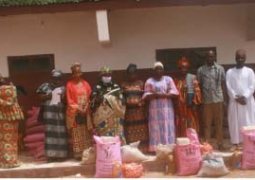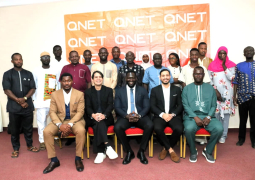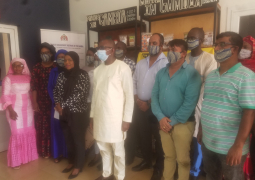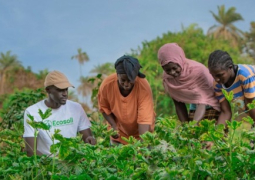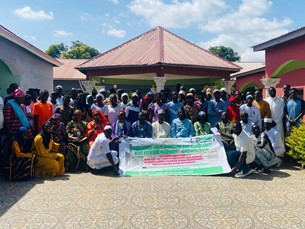
For Mama Tamba Jammeh, Coordinator of the Great Green Wall in The Gambia, the initiative is about more than planting trees, it’s about planting change.
“The environment is everyone’s business,” he said passionately. “With the calibre of individuals trained, we are optimistic the knowledge gained will be put into best practice. We believe these participants will share what they’ve learned with others. We must all come together to preserve our environment and its laws.”
Jammeh reminded attendees that every tree saved and every piece of land restored carries the promise of food on a family’s table, shade over a child’s head, and hope for a greener tomorrow.
Representing Democracy Next, James MacDonald-Nelson expressed enthusiasm about their collaboration with the Great Green Wall, which has been ongoing for over a year.
“It’s important to know how real climate change is and work towards resilience,” he told participants. “This initiative helps communities understand what climate change means for themselves, their communities, and their country. We are committed to continuous collaboration for the betterment of our environment.”
The partnership blends grassroots empowerment with civic engagement, reminding participants that climate change is not just an environmental issue, it’s a democratic one too.
Speaking on behalf of the Governor of the North Bank Region, Deputy Governor Dembo Samateh called for a shift in mindset.
“We are the ones cutting down the trees and not replanting,” he lamented. “We should adopt the habit of letting trees stay. We are all living the consequences of climate change. This should be a wake-up call for us all. We must stand in the fight against deforestation and other environmental problems.”
He added that communities must complement the government’s efforts in preserving the land, rather than wait for external assistance.
Echoing similar sentiments, Alhagie K. Saho, Vice Chairperson of the Kerewan Area Council, urged lawmakers to take action.
“We need laws that punish climate-related offences,” he said. “That will help instill discipline and remind everyone that protecting the environment is a shared responsibility.”
The event attracted a cross-section of stakeholders, including the National Assembly Member for Sabach Sanjal, the Executive Director of ADWAC, local leaders, councillors, and Seffos—all gathered with a common purpose: to heal the land that sustains them.
One of the most significant outcomes of the training was the creation of a Citizens’ Assembly on Climate Change Recommendations Report, a community-driven document that captures local voices and practical ideas to be shared with national stakeholders. The report is expected to guide future policies and community projects aimed at land restoration and environmental conservation.


